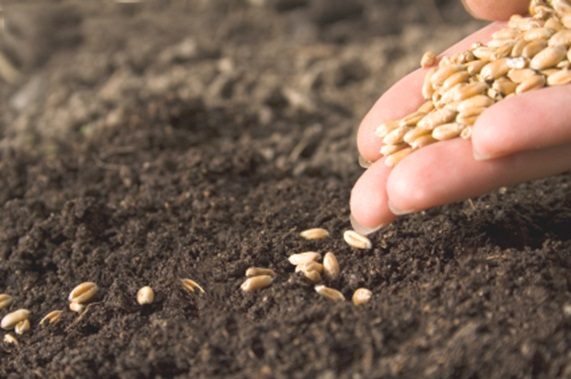- Strona główna
-
Nasza wspólnota
- About the saint...
- Archdiocese of Toronto
- Catholic Cemeteries
- Wolontariat
- Dostępność
- Polityka bezpiecznego środowiska
- Nasza wiara
- Życie parafialne
- Biuletyn
- Skontaktuj się z nami
- Wyszukaj

5th Sunday of Lent - Year B
Today’s scriptural texts give us a few images to feed our faith. In the Gospel (Jn 12:20-33), Jesus will offer the image of the grain of wheat falling to earth to die so as to produce much fruit. Anyone who has ever planted a seed can envision its seeming lifelessness as it is buried in the earth. But after a certain time a green sprout appears, announcing life where once there seemed to be only death. This surprising announcement of life also provides an apt image for Jesus who, as an obedient Son, suffered, died and was buried so as to become the source of our life and salvation (Hebrews 5:7-9, 2nd reading).
The dying seed image is also complemented by the Gospel’s second image, that of the Son of Man being lifted up in suffering and in glory and thereby drawing all of sinful humankind to himself and to God. In today’s 1st reading (Jer. 31:31-34), the prophet Jeremiah describes the drawing together and reconciliation of God and sinners in terms of a new and everlasting covenant. Where once the covenants between God and Israel evoked images of sacrificial animal, sprinkled blood, and stone tablets, the new covenant would, insisted Jeremiah, be written in the hearts of the faithful people by a loving God. Six centuries after this covenant was promised, it was realised through Jesus’ sacrificial death and continues to bind to God all who believe.
These images teach us that we must be willing to die to our own will if we wish to bear fruit for God. Concretely what does all this mean for us in everyday life? Consider some possibilities. Suppose our marriage is falling apart and we need outside help but are too proud to ask for it. Dying to our own will means dying to our pride and asking for help. Or suppose close friends tell us we are developing a drinking problem but we keep denying it, in spite of mounting evidence. Dying to our will means admitting our problem and seeking medical help. Suppose a friend or a family member has hurt us in some way and we are holding a grudge against him or her. Dying to our will means forgiving that person from the heart and treating him or her with love once again. Dying to our will is not easy. Even Jesus didn’t find it easy to agree to do whatever his Father wanted him to do. But he trusted God and put himself in his hands. The good news in today’s readings is that we can do the same.
YEAR OF PRAYER
On January 21, 2024, Pope Francis inaugurated a Year of Prayer ahead of the 2025 Jubilee, calling on the faithful “to pray more fervently to prepare ourselves to live properly this grace-filled event and to experience the power of hope in God.” The Year of Prayer, the Holy Father explained, is dedicated “to rediscovering the great value and absolute need for prayer, prayer in personal life, in the life of the Church, prayer in the world.” For more information, please visit:
ON STEWARDSHIP
If anyone would serve me,” says Jesus in today’s Gospel, “let him follow me; where I am, there will my servant be.” In what way is Jesus inviting me to follow Him? What service is He asking of me? See John 12:26
